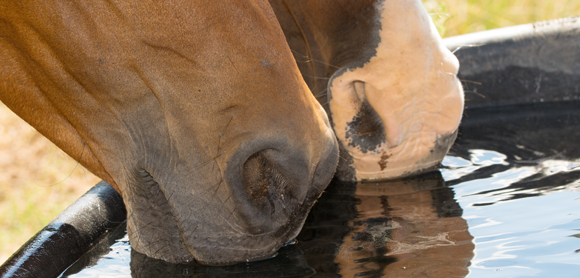
Keeping your horse hydrated during winter
Horse hydration is just as important in winter as it is in summer. How can you prevent dehydration and what are the symptoms to look out for?
Expert contributor: Vet Karen Coumbe.
Approved by Gil Riley.
Horses can survive for weeks without food, but only three or four days without water. Water is vitally important for their health and wellbeing, and makes up around 60% of their body weight.
Given the heat and sweat of the summer months, owners may think that horse dehydration is a fair-weather concern. However, it’s important to be aware of the risks of fluid loss year-round. Frozen drinking water and dropping temperatures in the winter months can mean that some horses actually drink less, increasing the possibility of dehydration.
Why is horse dehydration a concern?
Firstly, dehydration can increase the risk of colic. Horses store large amounts of water in their gastrointestinal tract and if this tract becomes too dry, there is a risk of impaction colic. This risk tends to be exacerbated in winter, when horses are stabled more, exercised less and eat an increased amount of fibre, such as hay.
Secondly, a dehydrated horse can be more prone to respiratory infections or the worsening of conditions such as recurrent airway obstruction. This is because the mucous lining the airways thickens and clears more slowly from the lungs.
How much water should a horse consume?
Whatever the weather or the season, average thoroughbred-sized horses need to drink at least 20 to 30 litres of water a day (so at least two big buckets, assuming a bucket equals 10 litres). They will need to drink more if they are doing lots of exercise. Mild dehydration is akin to a human hangover, and vets estimate that a 1% loss of hydration leads to 4% reduction in performance.
What are the symptoms of a dehydrated horse?
You need to know what is ‘normal’ for your horse – how often they pass urine and droppings, the colour of their mucous membranes, and their energy levels. Symptoms of dehydration to look out for include:
- Dark urine or not passing urine regularly
- Dull, listless or depressed appearance
- Gums and inside eyelids that are dark red rather than a healthy salmon pink
- Decreased performance levels
The 'skin pinch test' – where the skin is pinched and the time taken to return to normal counted in seconds – is no longer considered a reliable indicator of hydration levels. The gold standard test is a blood sample to confirm horse dehydration – consult your vet if you're in any way concerned about dehydration.
How to get a horse to drink more water
As the saying goes, you can lead a horse to water but you can't make it drink. To help prevent dehydration and encourage them to rehydrate, follow these six steps:
- Always ensure there is fresh water available. Horses don't like chilled water, especially in the winter, so add a little hot water if it's too cold.
- Always consider how much water your horse is getting in their feed. If their rations are dry, make extra effort to provide plenty of water.
- Break or melt ice on outdoor troughs every day, and take time to check that automatic drinking systems are not frozen. In sub-zero conditions, floating an apple in your horse's water buckets can help to slow down the freezing process through the fruit’s bobbing motion.
- The lush grass that horses graze on in the spring contains lots of moisture. In winter, horses tend to be stabled more, and therefore eat less grass and more hay. To ensure your horse is getting the moisture they need, soak the hay, or feed haylage rather than dry hay, as it has a higher moisture content.
- If your horse is drinking less than normal, consider adding electrolytes or a teaspoon of salt to their feed, which will encourage them to drink. But do consult your vet if you need to do this regularly, as large amounts of salt can be harmful.
- If your horse has a thick coat, they may sweat more profusely, so clipping will be beneficial.
Which tried-and-tested methods do you use to encourage your horse to drink through the winter? Share your ideas on our Facebook page and check out suggestions from other riders.



